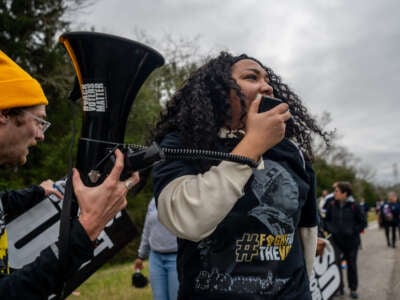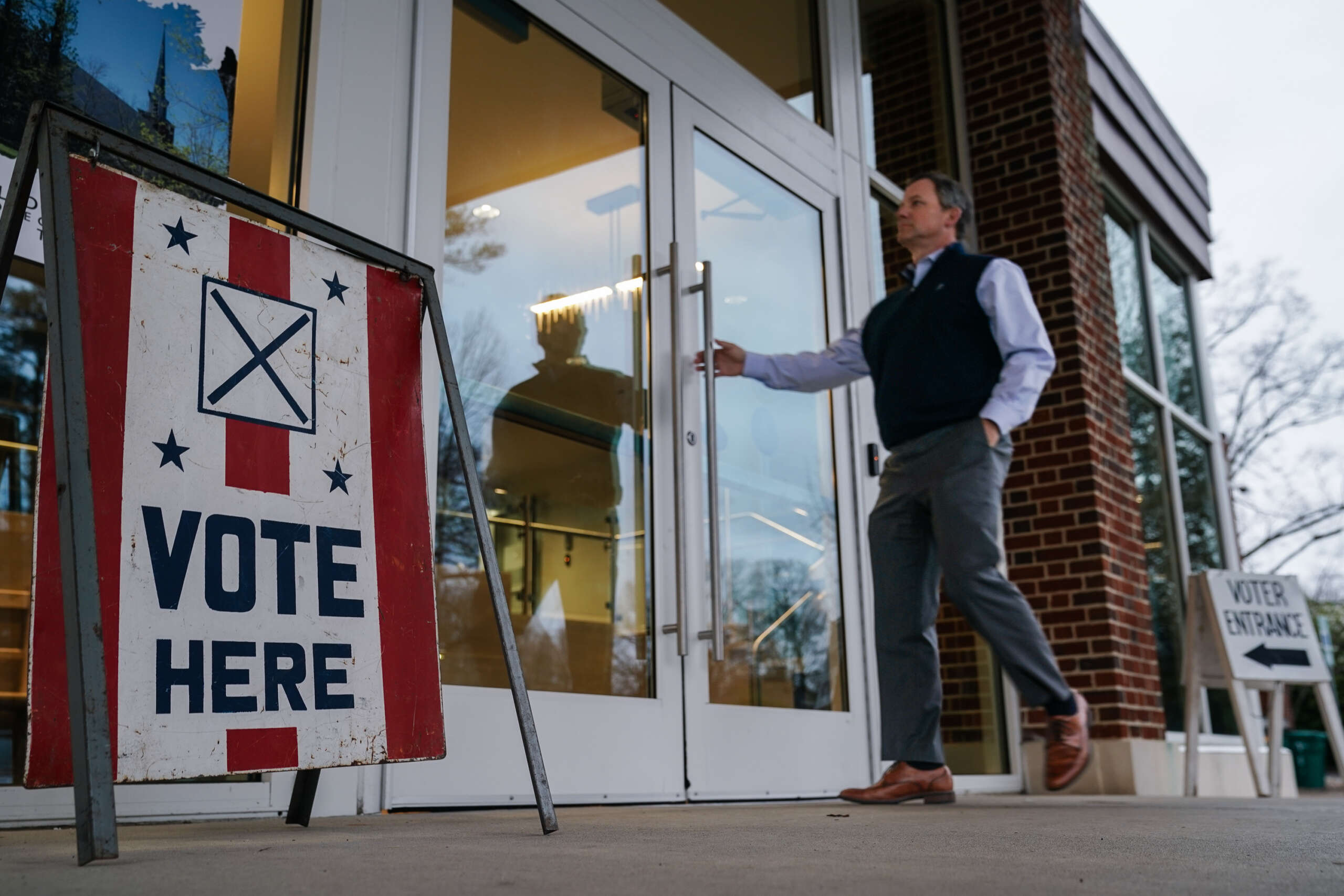Part of the series “Voting Errors”
Alabama may be the birthplace of the civil rights movement, but today it has some of the most restrictive voting laws in the country. With a historic election looming, a bill passed in March would further restrict access to polling places, threatening to disproportionately disenfranchise the state’s most marginalized group: people with disabilities.
Under Alabama’s Senate Bill 1 (SB1), anyone who assists or assists a voter in ordering, completing or delivering an absentee ballot application could be subject to criminal liability of up to 20 years in prison. Secretary of State Wes Allen, who has spent his career trying to restrict access to the ballot, argues that the new rules will prevent “activists” from “taking advantage.”[ing] “Excludes ballots from the absentee voting process.” SB 1 has been touted as a bill to prevent “ballot harvesting,” or the practice of individuals other than the voter returning a voter’s mail-in ballot, but the bill’s provisions only concern absentee ballot applications, not the ballots themselves.
Opponents argue that the bill infringes on the constitutional right of civic organizations and leaders to have a say in politics and disenfranchises voters who rely on assistance to obtain, complete and submit absentee ballot applications. Thirty percent of Alabama’s voters are people with disabilities, a disproportionate share of the electorate. If you add people age 65 and older, this figure rises to nearly 48% of Alabama’s voters. Many in this group have disabilities that limit their mobility, chronic illnesses, immunocompromises, or other reasons that prevent them from going to the polls on Election Day.
“This is simply voter suppression,” William Van Der Pol Jr., senior litigation counsel for the Alabama Disability Assistance Programs (ADAP), told Truthout. “Individuals, particularly individuals with disabilities whose only viable way to vote is by absentee ballot, are being shut out of the system.”
SB 1’s text provides an exception for voters with disabilities to receive assistance of their choice, but it uses language copied and pasted from the Voting Rights Act (VRA) of 1965, and the exception names only those voters who receive assistance. As written, someone who assists a voter with a disability could still be criminalized under SB 1. “If the assister is deemed a criminal, then by definition, that voter cannot receive assistance of their choice,” explained Valencia Richardson, legal counsel at the Campaign Legal Center (CLC).
Related

I participated in Freedom Summer in 1964. Sixty years later, with voting rights under attack, I see why we need another Freedom Summer.
The new law makes it a class B felony to “make any payment or gift” to anyone involved in assisting with an absentee ballot application. Class B felonies in Alabama include first-degree manslaughter and second-degree rape. The law also makes it a class C felony to “accept any payment or gift” to “distribute, order, request, collect, complete, pre-complete, obtain or deliver” another person’s ballot application. Anyone who pre-completes or submits another person’s absentee ballot application is guilty of a misdemeanor under SB 1.
Terms like “payment” and “gift” are not defined in SB1, so a friend offering postage stamps to mail an absentee ballot application or a grandmother offering her grandson ice cream as a reward after walking him to the mailbox to deliver the ballot application could be criminally liable. During the legislative process, one of the bill’s sponsors, Alabama Senator Garlan Gudger, suggested that absentee voters be given “postage stamps.” [or] The use of “absentee ballot stickers” in connection with absentee voting assistance would be a violation of the new law.
During public comment sessions before the bill’s approval, Alabamians sought evidence of the voter fraud that SB 1 proponents claimed the bill would solve. Lawmakers pointed to high absentee voting rates in several Alabama counties. According to the state’s absentee voting data, four Democratic-led counties in southern Alabama’s “Black Belt” have high absentee voting rates, sometimes approaching 20 percent, while the statewide rate is between 3 percent and 5 percent.
The Black Belt was originally named for its fertile, black soil, but took on a different meaning in the 19th century when plantations developed in the region and more than half of the nation’s slave population was forced to work there. Many of the descendants of this slave population still live in Black Belt counties today. Black people make up the majority of the region’s population, and are more likely to be disabled than the rest of Alabama. Nationwide, black adults have the highest disability rate at 40 percent.
Black voters are also more likely to have other circumstances that make them more likely to use absentee ballots, such as working long hours or living as a single parent. Much of Alabama’s Black Belt region is also rural, which can make it more difficult for them to get to the polls, especially since the state has closed dozens of polling places in recent years.
Incarcerated people who are eligible to vote also tend to need assistance, such as having prison officials mail them an absentee ballot application. People of color and people with disabilities are both over-represented among the US’s incarcerated population. “Absentee voting serves as a lifeline for citizens in many of these places,” Anuja Thatte, assistant attorney at the Legal Defense Fund (LDF), told Truthout. “Limiting access to polling places in this way really has very serious consequences.”
“This is simply voter suppression. … Individuals, particularly people with disabilities, for whom the only viable way to vote is by absentee ballot, are being excluded from the system.”
Prior to 2013, under the VRA, proposed changes to voting laws in Alabama and other places with a history of persistent discrimination were subject to a federal review process to ensure that the changes would not infringe on voting rights based on race or membership in other minority groups. But this preclearance process was put on hold in 2013 when the Supreme Court issued a controversial ruling that the formula used to determine which jurisdictions were covered by the VRA was unconstitutional. The Supreme Court case began when Shelby County, Alabama, sued the U.S. Attorney General. Richardson told Truthout that the connection to Alabama is “not coincidental” and reflects the state’s difficult history on voting rights issues.
In April of this year, a coalition of civil rights, voting rights, and disability rights groups filed a lawsuit in federal court to block SB 1. The coalition is represented by CLC, LDF, ADAP, and others. Plaintiffs include ADAP and other groups that promote civic engagement through voter education and outreach, including helping Alabamians vote absentee. The lawsuit argues that this activity constitutes “the essence of First Amendment expression” and that SB 1 violates this constitutional right.
“Our client is entitled to make a political point about the importance of voter assistance and voting, especially given the context in Alabama and how voter assistance has served as a vehicle for communicating core tenets of the civil rights movement and black liberation in Alabama,” Richardson said.
The lawsuit challenges SB 1 on the grounds that it violates the VRA and the Help America Vote Act of 2002. The act contains provisions to establish and improve voting participation for Americans with disabilities. One of these provisions provides grants to protection and advocacy programs such as ADAP to help people with disabilities vote.
“We receive funding from the federal government and, as a recipient of those funds, we are specifically required to assist individuals with disabilities throughout the voting process,” Van der Pol explained, “and we are being asked by the federal government to commit what is specifically a Class C felony under Alabama law. And it could be argued that the federal government is committing a Class B felony by paying us to do this.”
On May 3, 2024, the lawyers fighting to block SB1 filed a motion for a preliminary injunction, asking the court to halt enforcement of the law until the end of the litigation. A preliminary injunction would prevent the law from being enforced while the plaintiffs seek a permanent injunction at the end of the litigation, blocking the bill from going into effect. The defendants, including Alabama’s Secretary of State, opposed the motion for a preliminary injunction. On May 20, the defendants also filed a motion to dismiss the lawsuit.
Voters and organizers are concerned that if SB1 remains as a bill come November, it will lead to a decline in voter outreach and turnout. As Alabamians struggle to understand what actions could result in criminal charges and how any missteps could carry heavy penalties, many may decide not to provide the necessary assistance or vote at all. “One of the really important reasons we filed this lawsuit is because today, especially in a very important election year, this bill creates serious ambiguity and chilling effects and confusion on the field,” Tutte said.
Of greatest concern are voters with disabilities. “One of the biggest concerns we have is that they say we’re exempt, but we still don’t really know what that means,” Barbara Manuel, executive director of the Alabama-based National Federation of the Blind, told Truthout. Manuel said that even if the exception for disabled voters works, the uncertainty surrounding the law will put additional burdens on an already marginalized group. “This exception does nothing to alleviate the challenges that we’ve faced and will continue to face.”
Nathan Young, a disabled voter in Anniston, Alabama, and creator of “What the Hell Alabama,” a webseries that analyzes state politics, sees SB 1 as part of a wave of Republican-led disenfranchisement efforts in the state. “The people who need help voting absentee live in the Black Belt and poorer, more rural areas of the state, and they seem to tend to vote Democratic. There seems to be a concentrated effort to stop them from voting Democratic in the general election.”
As litigation over SB 1 continues, voters across Alabama are preparing for an election that will define the nation’s future, with fewer places to get the help they need under some of the most restrictive voting laws in the country. “Where voting rights are restricted, it’s common for civic groups to help bridge the gap between bad laws and voter engagement,” Richardson said. “Limiting or cutting off assistance only serves to further alienate historically marginalized voters.”
Copyright © Truthout. May not be reproduced without permission.
Source link

